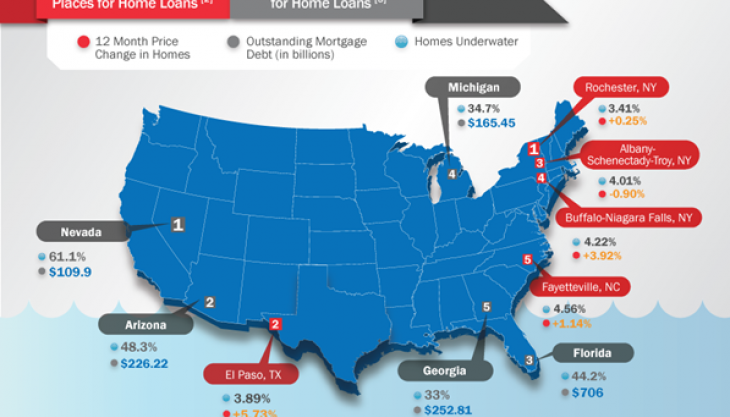5 Strategies for Protecting Your Home During Business Bankruptcy
Submitted by Rachel R on Wed, 01/02/2013 - 10:46am

Protecting your personal assets is often a person's biggest worry during the bankruptcy process, and never moreso than when it comes to your home. In addition to providing the basis for future security for your family, losing your home has a much more personal and emotional impact than many of the other parts of bankruptcy. The good news is that with the help of a good attorney, there are a number of options that can keep your home safe or help protect your equity during bankruptcy proceedings.
1. Business Formation. If you’re in the early stages of setting up your business, it’s a good time to think about the best way to legally structure it. If you go the sole-proprietorship route but eventually have to declare bankruptcy, your home could be jeopardized. The ideal business situation is to form a corporation, a limited liability company (LLC) or a partnership where you have a better chance of keeping your personal assets and business efforts separate. Make sure you support this by keeping seperate finances for your business and personal endeavors.
2. Don’t Make Business Personal. Even if you set up a formal, legally structured business such as the ones mentioned above, you can still find personal property like your home in jeopardy if you ever personally guaranteed repayment of business debts or pledged collateral towards a business loan. To the extent possible, you’ll be better off if you don’t do those things. Keep your personal wealth out of your business operations. If you're currently facing a situation where your personal property may be tied up with your business, talk to your attorney about options to seperate the two by restructuring your debt.
Image source: jackkoetting.com
3. Use Chapter 13 rather than Chapter 7. In a Chapter 7 bankruptcy, some or all of your assets may be liquidated to pay creditors. This could include your house, but there are protections for at least a certain amount of equity in your home. If you have a lot of equity in your home, you could be forced to sell, in which case you would get the protected equity portion of the sale. The rest of the funds would be used to pay creditors. In a Chapter 13 filing, a payment plan is worked out (if possible) so that you hang on to all of your property and pay off debts or get caught up on back payments over a period of 3-5 years. In either case, the automatic stay from the courts will stop creditors from attempts to collect, including foreclosure. This can buy you important time to strategize and come up with alternate arrangements to save your home and business.
4. Find Out about Your State’s Homestead Exemption. If you go the Chapter 7 route, federal law protects up to $20,000 of the equity you’ve built up in your home. If you have a lot more equity in your home than that, then you’ll probably want to use your state’s homestead exemption, which might be more generous than the federal exemption. For example, New Hampshire protects up to $100,000 in equity. Alabama, however, only protects up to $5,000. A few states (Florida, for example) protect the total value of your home in bankruptcy. The figures vary widely and local factors may come into play, so discuss specifics of North Carolina law with your attorney.
5. Consult with a Qualified Bankruptcy Attorney. It's important to partner with a qualified bankruptcy attorney when developing the plans for your bankruptcy. You have the best chance of an equitable settlement with an expert and advocate on your side. During your first meeting, detail all of your debts and all of your assets. If you have specific priorities, such as protecting your home, discuss those early in your conversations. Not only will this allow you to work together to craft a plan that's more likely to meet your needs, but to give you the widest range of options to consider.
If you’re struggling with how to manage your debt payments, talking to an experienced bankruptcy attorney can help you explore all of your options and choose the one that’s right for your situation. The knowledgeable bankruptcy professionals at the Law Offices of John T. Orcutt are here to help guide you on the path to regaining your financial footing.
Dedicated to helping residents of North Carolina find the best solutions to their debt problems. Don’t waste another day worrying about your debt. Call +1-833-627-0115 today to schedule a free initial consultation to discuss your bankruptcy options.
Debts Hurt! Got debt? Need help? Get started below!
Serving All of North Carolina
- Bankruptcy Attorneys Raleigh NC (North)
- Bankruptcy Attorney Fayetteville NC
- Bankruptcy Attorney Durham NC
- Bankruptcy Attorneys Wilson NC
- Bankruptcy Attorneys Greensboro NC
- Bankruptcy Attorneys Southport NC
- Bankruptcy Attorneys Wilmington NC
Bankruptcy Attorneys Raleigh NC (North)
6616 Six Forks Rd #203 Raleigh, NC 27615 North Carolina
Tel: (919) 847-9750

Bankruptcy Attorney Fayetteville NC
2711 Breezewood Ave Fayetteville, NC 28303 North Carolina
Tel: (910) 323-2972

Bankruptcy Attorney Durham NC
1738 Hillandale Rd Suite D Durham, NC 27705 North Carolina
Tel: (919) 286-1695


Bankruptcy Attorneys Greensboro NC
2100 W Cornwallis Dr. STE O Greensboro, NC 27408 North Carolina
Tel: (336) 542-5993

Bankruptcy Attorneys Southport NC
116 N Howe St. Suite A Southport, NC 28461 North Carolina
Tel: (910) 218-8682

Bankruptcy Attorneys Wilmington NC
116 N. Howe Street, Suite A Southport, NC 28461 North Carolina
Tel: (910) 447-2987
